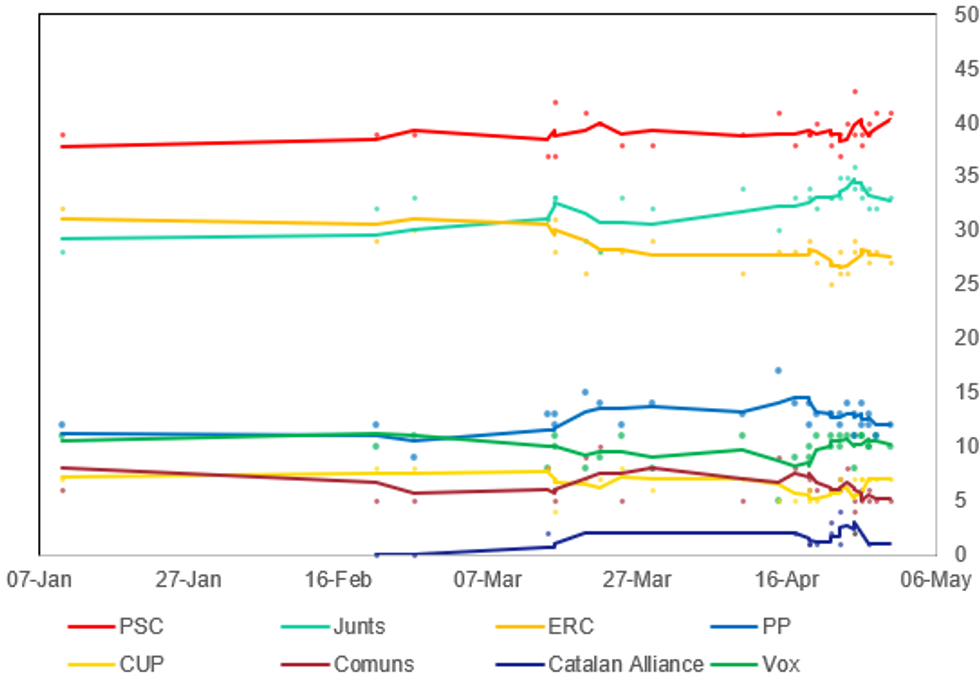-
Policy
Policy
Exclusive interviews with leading policymakers that convey the true policy message that impacts markets.
LATEST FROM POLICY: -
EM Policy
EM Policy
Exclusive interviews with leading policymakers that convey the true policy message that impacts markets.
LATEST FROM EM POLICY: -
G10 Markets
G10 Markets
Real-time insight on key fixed income and fx markets.
Launch MNI PodcastsFixed IncomeFI Markets AnalysisCentral Bank PreviewsFI PiFixed Income Technical AnalysisUS$ Credit Supply PipelineGilt Week AheadGlobal IssuanceEurozoneUKUSDeep DiveGlobal Issuance CalendarsEZ/UK Bond Auction CalendarEZ/UK T-bill Auction CalendarUS Treasury Auction CalendarPolitical RiskMNI Political Risk AnalysisMNI Political Risk - US Daily BriefMNI Political Risk - The week AheadElection Previews -
Emerging Markets
Emerging Markets
Real-time insight of emerging markets in CEMEA, Asia and LatAm region
-
Commodities
-
Credit
Credit
Real time insight of credit markets
-
Data
-
Global Macro
Global Macro
Actionable insight on monetary policy, balance sheet and inflation with focus on global issuance. Analysis on key political risk impacting the global markets.
Global MacroDM Central Bank PreviewsDM Central Bank ReviewsEM Central Bank PreviewsEM Central Bank ReviewsBalance Sheet AnalysisData AnalysisEurozone DataUK DataUS DataAPAC DataInflation InsightEmployment InsightGlobal IssuanceEurozoneUKUSDeep DiveGlobal Issuance Calendars EZ/UK Bond Auction Calendar EZ/UK T-bill Auction Calendar US Treasury Auction Calendar Global Macro Weekly -
About Us
To read the full story
Sign up now for free trial access to this content.
Please enter your details below.
Why MNI
MNI is the leading provider
of intelligence and analysis on the Global Fixed Income, Foreign Exchange and Energy markets. We use an innovative combination of real-time analysis, deep fundamental research and journalism to provide unique and actionable insights for traders and investors. Our "All signal, no noise" approach drives an intelligence service that is succinct and timely, which is highly regarded by our time constrained client base.Our Head Office is in London with offices in Chicago, Washington and Beijing, as well as an on the ground presence in other major financial centres across the world.
Real-time Actionable Insight
Get the latest on Central Bank Policy and FX & FI Markets to help inform both your strategic and tactical decision-making.
Free AccessMNI EUROPEAN MARKETS ANALYSIS: ECB Expected To Cut Rates Later
MNI EUROPEAN OPEN: A$ & Local Yields Surge Following Jobs Data
Polls Show Catalan Election On Knife Edge
Catalonia holds a snap regional election on 12 May after President Pere Aragonès dissolved the Catalan parliament following a failed budget vote in March. Given Catalonia's sizeable independence movement, and its significant representation in the Spanish economy (accounting for around 20% of the country's GDP), the election will garner notable political and market interest.
- Polls show the centre-left pro-union Socialists' Party of Catalonia (the sister party of Spanish PM Pedro Sanchez's PSOE) on course to win a plurality. Two pro-independence parties, the populist Junts per Catalunya (Together for Catalonia) and the leftist Republican Left of Catalonia (ERC) are vying for second place.
- An average of seat projections for the last week of April show how close the election is at present. The total for the pro-union parties - PSC, centre-right Popular Party (PP), right-wing Vox, and left-wing Comuns-Sumar - stood at 68 seats. The total for the pro-independence parties - Junts, ERC, and the far-left Popular Unity Candidacy (CUP) - also stood at 68 seats. The balance could be decided if the right-wing pro-independence Catalan Alliance enters the parliament, but at present it is on the threshold of 3% support.
- The rhetoric both in Catalonia and the rest of the country regarding the situation in the community's politics remains visceral. PM Sanchez's opponents continue to call out the amnesty deal that has seen former Catalan President Carles Puigdemont allowed to return to the country and run for office in exchange for Junts voting in favour of Sanchez remaining PM.
- Given the PSC-PSOE is running against Junts and the ERC in Catalonia, but reliant on their support in Madrid, there is the potential for political instability both during and after the election period.
 Source: ElectoPanel, KeyData, NC Report, GAD3, Feedback, YouGov, Target Point, Cluster 17, Sociometrica, GESOP, Simple Logica, Data10, Sigma Dos, Ipsos, MNI
Source: ElectoPanel, KeyData, NC Report, GAD3, Feedback, YouGov, Target Point, Cluster 17, Sociometrica, GESOP, Simple Logica, Data10, Sigma Dos, Ipsos, MNI
To read the full story
Sign up now for free trial access to this content.
Please enter your details below.
Why MNI
MNI is the leading provider
of intelligence and analysis on the Global Fixed Income, Foreign Exchange and Energy markets. We use an innovative combination of real-time analysis, deep fundamental research and journalism to provide unique and actionable insights for traders and investors. Our "All signal, no noise" approach drives an intelligence service that is succinct and timely, which is highly regarded by our time constrained client base.Our Head Office is in London with offices in Chicago, Washington and Beijing, as well as an on the ground presence in other major financial centres across the world.
